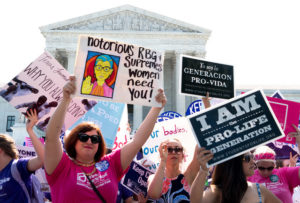
Alabama criminalizes abortion, U.S. Supreme Court allows iPhone owners to sue Apple, and more…
IN THE NEWS
- Alabama enacted a law that criminalizes abortion except if “necessary in order to prevent a serious health risk to the unborn child’s mother” or “when the unborn child has a lethal anomaly.” The law does not include exceptions for rape or incest, although it does not apply to embryos discarded during in vitro fertilization. After signing the bill into law, Governor Kay Ivey (R) noted that the bill presents an opportunity for the U.S. Supreme Court to revisit Roe v. Wade. Cecile Richards, the former president of Planned Parenthood, said that the law “the most extreme ban on abortion we’ve seen since Roe,” warning that it and those like it would cause “women to pay with their health and often their lives.”
- In a 5–4 vote, the Supreme Court ruled that iPhone owners may sue Apple for allegedly monopolizing its App Store, even though app developers pay the alleged monopoly price before allegedly passing them on to end consumers. Writing for the majority, Justice Brett Kavanaugh held that the Court’s Illinois Brick decision—which prohibits “indirect purchasers” such as end consumers from claiming antitrust damages under federal antitrust law—does not bar iPhone owners from bringing a claim because they are “direct purchasers” of products from Apple. In dissent, Justice Neil Gorsuch argued that iPhone owners should be considered to be indirect purchasers and criticized the majority’s ruling as a formalistic construction of the Illinois Brick rule.
- In a memo released to the public this week, the National Labor Relations Board (NRLB) concluded that Uber drivers are independent contractors, not employees. NLRB reasoned that drivers have “virtually complete control” over their cars and schedules as well as their “freedom to work for competitors.” But Laura Padin of the National Employment Law Project disagreed, stating that the memo did not “give proper weight” to the control Uber asserts over pricing, pay rates, and driver requirements.
- The U.S. Department of Commerce will add Huawei, a Chinese telecommunications company, to its Entity List, which identifies persons and companies that might pose a threat to U.S. national security or foreign policy interests. Those on the list may not acquire American technology without approval from the Commerce Department. “This will prevent American technology from being used by foreign owned entities in ways that potentially undermine U.S. national security or foreign policy interests,” Secretary of Commerce Wilbur Ross said.
- The San Francisco Board of Supervisors passed the Stop Secret Surveillance ordinance, which bans the use of facial recognition software by city agencies and law enforcement. The ordinance states that facial recognition technology’s propensity “to endanger civil rights and civil liberties substantially outweighs its purported benefits.” Daniel Castro, vice president at the Information Technology and Innovation Foundation, stated that there are legitimate uses for the technology, and he criticized the ban as “anti-tech” and “anti public safety.”
- The U.S. Environmental Protection Agency (EPA) requested public input on a draft study exploring the regulation and reuse of wastewater from the oil and gas industry. Most wastewater is currently disposed of by injecting it deep underground, which prevents the water from being reused. EPA invited comments on how the agency could encourage reuse of waste water “within and outside of” oil and gas production facilities through both regulatory and non-regulatory efforts.
- Maryland Governor Larry Hogan (R) signed a bill raising the minimum age for purchasing tobacco from 18 to 21. Hogan singled out “the sharp rise in teen vaping” as a motivating factor behind the bill. Juul, an electronic cigarette company, applauded the bill and expressed hope that “more jurisdictions follow in Maryland’s example.”
- In a letter to Congress, President Donald Trump proposed several 2020 budget amendments for agencies including the U.S. Department of Defense, U.S. Department of Education, EPA, U.S. Army Corps of Engineers, and National Aeronautics and Space Administration (NASA). The amendments would increase funding for the Special Olympics, EPA and Army Corps projects in the Great Lakes and Florida Everglades, and NASA efforts to return American astronauts to the moon.
- President Trump nominated Jeffrey Byard to serve as administrator of the Federal Emergency Management Agency (FEMA). Byard currently serves as FEMA’s Associate Administrator for the Office of Response and Recovery.
WHAT WE’RE READING THIS WEEK
- A Supreme Court decision this week that “has nothing to do with abortion” may set the stage for the end of Roe v. Wade, according to Leah Litman of the University of California, Irvine School of Law in a column for The New York Times. Generally, the Court has deferred to its prior decisions under a doctrine called stare decisis, but, in Franchise Tax Board v. Hyatt, the conservative Justices suggested that they are “perfectly content to overrule a precedent merely because they disagree with it,” Litman opined. She noted that Justice Stephen Breyer, in a dissent in Hyatt, wrote that the majority’s decision “can only cause one to wonder which cases the court will overrule next,” while citing to Planned Parenthood v. Casey, the Court’s 1992 opinion that narrowly declined to overrule Roe.
- In a forthcoming article in the Iowa Law Review, John T. Holden of Oklahoma State University discussed the regulation of sports betting following the Supreme Court’s decision in Murphy v. NCAA. Holden observed that the federal government, state governments, and Native American tribes all can regulate sports betting, and he emphasized the importance of potential partnerships between states and tribes. Holden also cautioned against focusing regulations on revenue alone, as high tax rates could lead to uncompetitive prices and drive bettors toward illegal markets.
- In a recent paper, Leon Perlman of the Digital Financial Services Observatory at Columbia Business School proposed a model regulatory framework for several types of crypto-assets derived from distributed ledger technology, commonly known as blockchain technology. Perlman defined several evolving types of crypto-assets and recommended what he sees as the most appropriate regulatory authorities for each, including central banks, securities regulators, and commodity regulators. He also argued that a more consistent regulatory framework would allow crypto-assets to be “further integrated into a financial ecosystem.”



